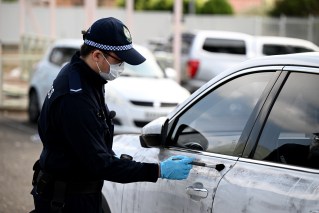What is the ICAC, and how did it get O’Farrell?
The Independent Commission Against Corruption (ICAC) has claimed another high profile scalp in Premier Barry O’Farrell, who failed to declare a $3000 bottle of Penfolds Grange Hermitage.
With less stringent rules concerning what evidence is admissible than in criminal courts, the ICAC is a powerful body well-suited to investigating corruption. While it cannot convict the lawmakers hauled before it, it does have broad powers to gather information, compel witnesses – and, as illustrated today, end political careers in a blaze of publicity.

Former NSW Premier Nick Greiner. Picture: Getty
In 1988, then NSW Premier Nick Greiner played a key part in creating the ICAC. Those with a long political memory will recall that Premier Nick Greiner’s career ended in 1992 after an ICAC inquiry.
Now that it has claimed two Premiers, is the ICAC the best tool for eradicating corruption in Australian politics? Should it be rolled out in every state? Or is an entire career a price too dear to pay for a bottle of wine?
Oh, the irony
In 1988, then NSW Premier Nick Greiner played a key part in creating the ICAC.
Associate Professor Geoffrey Hawker of Macquarie University said the Premier’s aim was to investigate corruption in previous Labor governments, but ended up becoming its first victim “in an even more unexpected way” than Mr O’Farrell.
Premier Barry O’Farrell also tried to wield the ICAC as a political weapon against his foes and has been similarly undone, Associate Professor Hawker said.
“This is the second Liberal premier that’s been brought down by ICAC,” said Associate Professor Hawker. “There’s such a double irony here.”
There’s such a double irony here
There is a lesson to be learned from this “curious parallel” – that ICAC is a can of worms you don’t want to poke, Hawker said.
“One doesn’t want to be too moralistic about this, but you’d hope that politicians on all sides draw some lessons from this,” he said.
Necessary power

The letter that cost Barry O’Farrell his job.
Olivia Monaghan, research officer at the Transnational Research Institute on Corruption in Canberra, said the ICAC’s enormous powers are justified.
“The ICAC still needs the powers of investigation that it has because without that the whole AWH [Australian Water Holdings] case wouldn’t have seen the light of day,” Ms Monaghan said. “It’s dangerous to look at one case, and condemn the whole body. You don’t chop off a limb and curse the tree.”
Should Victoria adopt the ICAC model?
Based on her research, Ms Monaghan said Victoria’s Independent Broad-based Anti-corruption Commission (IBAC) will never be able to keep pace with its NSW counterpart, because its powers are not far reaching enough.
“You can’t have an organisation with no teeth trying to keep up with one that does,” she said.
You can’t have an organisation with no teeth trying to keep up with one that does
Ms Monaghan even said that one way to interpret the weak powers of IBAC is that corruption has more of a hold in Victoria than in New South Wales.
“If you’re a cynic, then you could easily say that,” Ms Monaghan said. “The anti-corruption legislation was watered down a number of times in Victoria. Cynics might argue that that is a lack of political will, but you can’t prove that.
Ms Monaghan believes that ICAC could become a victim of its own success. Mr O’Farrell’s surprising demise could deter other politicians from tackling corruption “because they don’t want to be the person whose skull gets taken,” she said.
Wrong focus
Senior political lecturer at Deakin University Dr Geoffrey Robinson agreed that Victoria’s IBAC is “a much weaker body”, but is wary of giving it greater powers.

Barry O’Farrell sensationally resigns.
Robinson said the supporters of IBAC “very much look towards the ICAC sort of model,” but he foresees potential downsides to rolling out the New South Wales model across Australia.
Robinson said the ICAC is better at catching out politicians like Mr O’Farrell on slips ups in their testimony than on catching large-scale corruption, and could see that pattern being repeated.
If not ICAC, then what?
Associate Professor Geoffrey Hawker acknowledged that “there’s no easy, simple way” to fix the problem of corruption.
“I think the political parties have absolutely got to take the lead. They just have to do everything they can to expose it and cleanse their own ranks,” Hawker said. “It’s easy to say that. It’s bloody difficult to do, particularly when your leader, who has made a bit of a play about all this, proves to be deficient themselves.”
Rather than replicating ICAC across the nation, Dr Geoffrey Robinson thought that “it’s definitely worth thinking about” banning politicians from migrating to the business sector and serving on various boards.
Corporate cosiness with government is more troubling than outright bribes being handed to politicians in brown paper bags, Robinson said – even though this is the hardest form of shady dealing to penalise.








